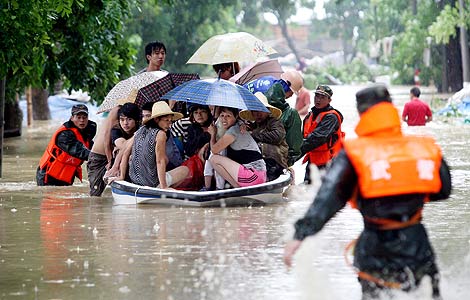China, US impacts Asian economies differently
Updated: 2013-08-17 11:47
(Xinhua)
|
||||||||
SINGAPORE - Developments in China and the United States, the world's two largest economies, that would include a softer growth in China and the paring down of monetary stimulus in the United States, could have varied impact on the emerging Asian economies, according to analysts.
Based on the economic data released so far, China's economic growth in the second half is likely to stay broadly similar to that in first half of this year, whereas that of the United States is likely to accelerate after the softest point of the year.
As China has grown in economic importance in Asia over the United States these past few years, the question now is which of the two countries would have bigger effect on the growth of the emerging economies in the region.
According to Standard Chartered Global Research, the more open economies in the region were generally more affected by the United States and China than the closed economies.
The other observation is that the United States generally affects Asia's growth more than China does in the past decade, although the picture had somewhat changed in recent years.
For instance, the economic growth in Thailand, China's Taiwan and Hong Kong was heavily affected by the United States, followed by Singapore, Malaysia and South Korea from first quarter of 2003 to the first quarter of 2013. The United States had a stronger influence than China on the six Asian economies where results were significant for both the US and China's influence.
However, the picture for first quarter of 2008 to first quarter of 2013 is markedly different from the 10-year period up to early 2013. First, China's impact on Asia's growth became much stronger. Growth in Northeast Asia and Singapore was closely tied to China's growth.
US growth was still significant for a lot of Asian countries but the overall influence eased with China's rapid expansion.
Except for Malaysia, the economies of Singapore, China's Taiwan, South Korea and China's Hong Kong, where both China and US growth had a significant impact between 2008 and early this year, were more affected by China, rather than US growth.
Standard Chartered said it will be crucial for any slowdown in China to be moderate and gradual to allow economies to adjust without suffering too much volatility.
Most Viewed
Editor's Picks

|

|

|

|

|

|
Today's Top News
CSRC blames Everbright Securities for spike
SAFE denies intense capital outflow
Debt crisis unlikely in short term: Think tank
Dozens die in Egyptian bloodbath
Watchdog won't block Abe's military changes
Xi vows medical support to Africa
China trims US Treasury holdings in June
Defense chief kicks off US visit
US Weekly

|

|















